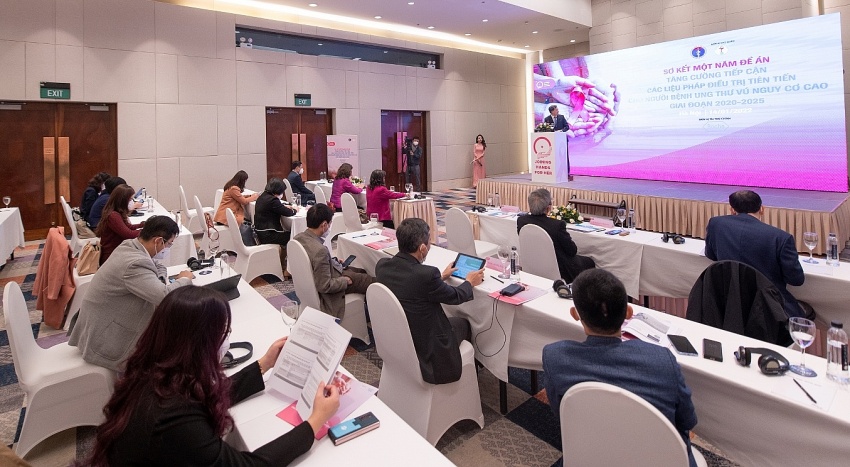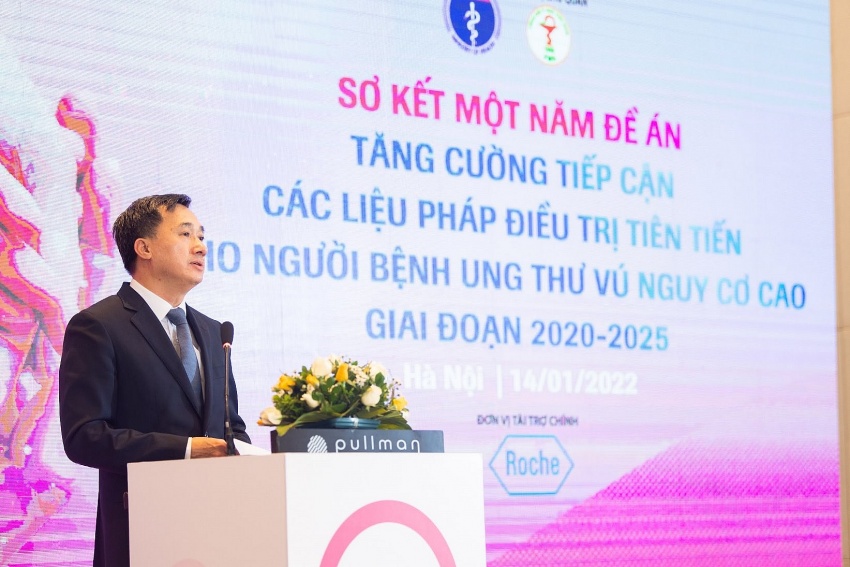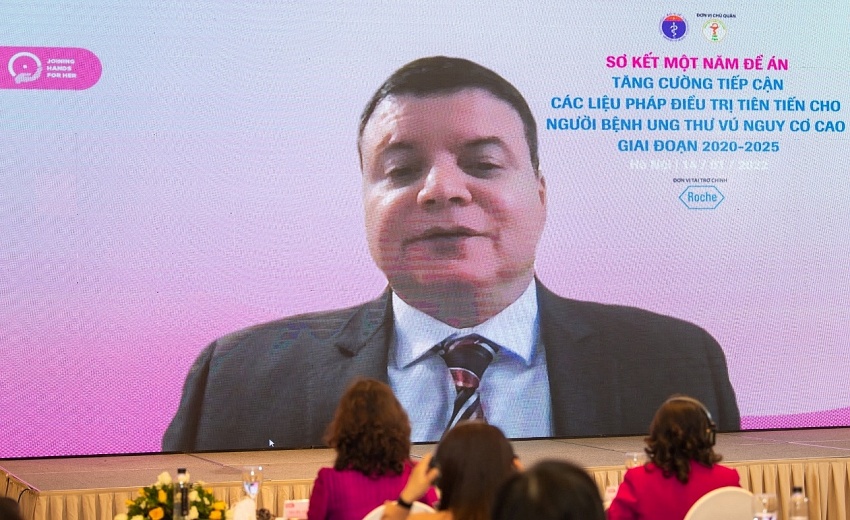Improving access to innovative therapies for high-risk breast cancer patients in Vietnam
 |
| The meeting to review the first year of the project's implementation |
The strategic project has achieved positive and sustainable progress, thanks to the innovative and close cooperation among key stakeholders at the government level, including the Ministry of Health, Vietnam Social Security, and Vietnam Health Insurance, as well as medical institutions, major hospitals, and Roche Vietnam.
At the meeting, Deputy Minister of Health Tran Van Thuan said, “The project has made important contributions to achieving the objectives of the National Strategy for Prevention and Control of Non-Communicable Diseases like cancer in 2015-2025.
 |
| Deputy Minister of Health, Prof. Dr. Tran Van Thuan |
According to the Global Cancer Observatory, with more than 21,500 new cases diagnosed per year, breast cancer is the most common cancer type among Vietnamese women. At the same time, with 9,345 deaths per year, breast cancer is the third most fatal cancer type in Vietnam, after liver and lung cancer.
Addressing the unmet demand for better awareness and treatment, the project is the very first comprehensive project targeting breast cancer in Vietnam. It is deployed in key hospitals nationwide with collaboration by several healthcare stakeholders since 2020.
 |
| Lennor Carrillo, general manager at Roche Pharma Vietnam |
Lennor Carrillo, general manager at Roche Pharma Vietnam said, “As a global pioneer in pharmaceuticals and diagnostics, Roche is committed to working with Vietnam to address healthcare challenges through a variety of activities. Roche Vietnam is proud to be part of the project and is delighted to witness the success after a year of implementation. We are looking forward to a better future for breast cancer patients and the Vietnamese healthcare system in general.”
For many years, many breast cancer patients in Vietnam were diagnosed at late stages of the disease due to limited public awareness and understanding of the importance of early screening. Meanwhile, screening services were not covered by health insurance, disincentivising voluntary testing. Thus, one of the four goals of the project is to increase awareness and early breast cancer detection rates among high-risk women.
Amid the project, a highlighted programme called Joining Hands for Her offered screenings to approximately 3,000 women in their 40s nationwide. The screenings took place at seven hospitals – including the Vietnam National Cancer Hospital, Bach Mai Hospital, Hai Duong Medical Technical University, and Hue Central Hospital.
Several project initiatives have been also implemented, both online and offline. Specifically, a great number of medical staff were provided training on multidisciplinary treatment and clinical research at five key hospitals participating in the project, namely the Vietnam National Cancer Hospital, Bach Mai Hospital, Hanoi Oncology Hospital, Ho Chi Minh City Oncology Hospital, and Cho Ray Hospital, contributing to a measurable improvement in the quality of patient services.
Another important objective of the project is to build a database for breast cancer diagnosis and treatment. After a year of implementation, 11 health-economic research projects have been implemented on breast cancer screening and treatment.
These projects have conducted a systematic review of the cost-effectiveness of breast cancer screening detection strategies as well as an overview of related payment policies. Six out of 11 studies were completed, and the results provided useful information and recommendations for the database building, the creation of appropriate strategies, and the sustainable improvement of quality of life for patients with breast cancer.
What the stars mean:
★ Poor ★ ★ Promising ★★★ Good ★★★★ Very good ★★★★★ Exceptional
Themes: Healthcare Platform
- Opella and Long Chau join forces to enhance digestive and bone health
- Hanoi intensifies airport monitoring amid Nipah disease risks
- Cosmetics rules set for overhaul under draft decree
- Policy obstacles being addressed in drug licensing and renewal
- Sanofi, Long Chau Pharmacy relaunch medicine blister pack collection initiative
Related Contents
Latest News
More News
- Hanoi intensifies airport monitoring amid Nipah disease risks (January 29, 2026 | 15:21)
- Congratulations from VFF Central Committee's int’l partners to 14th National Party Congress (January 25, 2026 | 09:46)
- List of newly-elected members of 14th Political Bureau announced (January 23, 2026 | 16:27)
- 14th Party Central Committee unanimously elects To Lam as General Secretary (January 23, 2026 | 16:22)
- List of members of 14th Party Central Committee announced (January 23, 2026 | 09:12)
- Highlights of fourth working day of 14th National Party Congress (January 23, 2026 | 09:06)
- Press provides timely, accurate coverage of 14th National Party Congress (January 22, 2026 | 09:49)
- Press release on second working day of 14th National Party Congress (January 22, 2026 | 09:19)
- Minister sets out key directions to promote intrinsic strength of Vietnamese culture (January 22, 2026 | 09:16)
- 14th National Party Congress: Renewed momentum for OVs to contribute to homeland (January 21, 2026 | 09:49)

 Tag:
Tag:






















 Mobile Version
Mobile Version